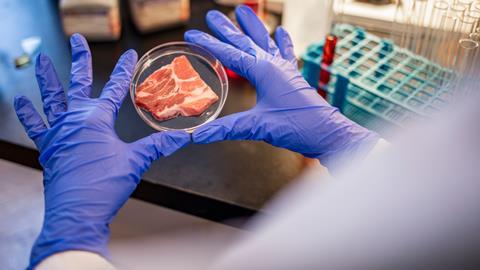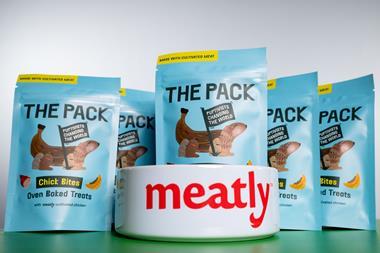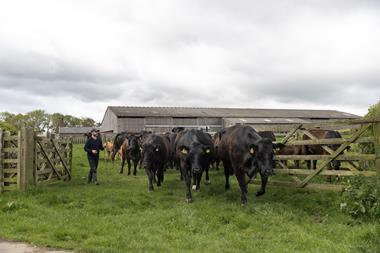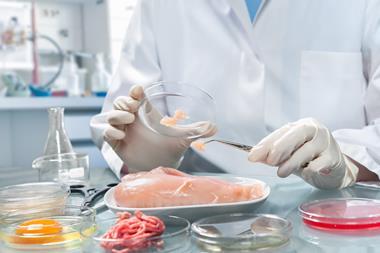Food Standards Agency bosses found it hard to contain their excitement at the prospect of the UK soon becoming a world leader in the production of lab-grown meat for human consumption.
The sentiment was almost the exact opposite to the initial reaction of most people when they first try to get their heads around the idea of chomping on a lab-grown steak or a cell-cultivated foie gras.
The reason for the FSA’s happiness was a £1.6m grant from the Department for Science, Innovation and Technology (DSIT) which will fund a new “sandbox” programme, establishing a dedicated team to gather “rigorous scientific evidence” on cell-cultivated products (CCPs) and the technology behind them.
The FSA’s hope is that during its two-year mission, the sandbox will lead to a rapid explosion on to the market of CCPs, with the four existing product applications anticipated to rise to at least 15 and possibly many more.
But is its optimism justified? Or is this landmark day for lab-grown meat just the start of the sort of battle seen elsewhere in Europe and the United States where politicians and food safety experts have been pitched into a bitter row between traditional farmers and an industry waiting in the wings that wants to change forever the way we eat?
Bigger budget than it looks
On the surface £1.6m doesn’t seem very much to get excited about, certainly not compared to the sort of money that would normally be required to successfully launch an entirely new food sector. It wouldn’t even register as a particularly big budget for a single product marketing campaign.
But the stakes, or rather the lab grown ones, are higher than the figure itself would suggest, with the FSA having been justifiably unsure whether the new Labour government would share its enthusiasm for this new area of innovation, despite its potential to tackle environmental and nutritional issues.
The fact that the bid for the sandbox was part of a wider programme born under previous Prime Minister Rishi Sunak meant it could easily have disappeared into the financial black hole Chancellor Rachel Reeves is reportedly peering into before her budget later this month.
Instead, not only has Labour gone ahead with the grant, it’s also approved FSA moves made before the election to slash the parliamentary red tape over approvals for regulated food, as well agreeing to take the axe to the huge backlog of products waiting for re-approval, which until now has meant lab grown meat, CBD and insect based foods were facing waits extending many years before they could even hope to get to market, effectively making them non-viable.
Compared to that a two-year lead time, as seemingly offered by the sandbox, appears lightning fast and firms like French lab chicken company Vital Meat, Israeli cell cultivated beef manufacturer Aleph Farms, French startup Gourmey (of lab-grown foie gras fame) and Ivy Farms, look likely to be joined by a number of others in months to come.
The flood of reaction from companies involved in the space, both in human and animal food development, certainly suggests the FSA may be right about the spark this could create.
Rather than a physical centre, the sandbox, which will launch in February, will involve the FSA working in tandem with company scientists to tackle safety fears over the revolutionary techniques involved in a much quicker way than could otherwise have been imagined.
However, the new government’s support does not yet extend to wider plans hatched by the FSA to shake up the regulatory process for the raft of regulated products, including lab-grown meat, insect food and CBD, which would see the UK work with other countries like Singapore and Australia to allow products approved abroad to come to the UK market, if they have trusted regulatory regimes.
Despite this the agency said it planned to allocate some of the funding to draw up an international regulatory framework towards such a goal.
And whilst the primary job of the sandbox will be to prove that the products are safe, the FSA has made no secret of its hope that they could go on to have enormous beneficial impacts on the planet.
“Many people hope and believe that one part of how we get to Net Zero will be by reducing meat eating in our diets,” it said today.
“Much has been written about lab-based meat but to move from the excitement and ambition we need to do hard science.
“Science on which kinds of approaches will produce tasty alternatives. Science on how we can ensure those products are safe to eat. And science on how to ensure they are nutritious and as good for our health as they will be for the environment.”
Leading food lawyers say today’s news could be a landmark moment, with many companies waiting in the wings with products now likely to come forward.
But there was no mention by the FSA of the potential political battle that lies ahead, not just to win government support but to overcome opposition from farmers, if there is anything like the backlash seen in other countries.
In November last year, Italy voted to ban outright the production, sale or import of cultivated meat or animal feed, in what its right-wing government called a defence of the nation’s tradition.
Similar bitter rows have been sparked in states across the US, where hardcore Republicans have almost made an anti-lab-grown meat stance part of the MAGA cause.
The FSA could find itself entering a political firestorm. In July the Grocer revealed an investigation by Greenpeace claimed high-level lobbying from senior beef industry executives and livestock interests had been a major factor behind opposition from European MPs to the sector.
Will the same happen in the UK, or will farmers here take a more prosaic approach? How will lab-grown meat fit in with Labour’s plans?
Either way we will soon find out.




















1 Readers' comment